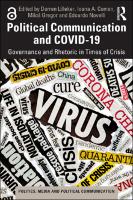Political Communication and COVID-19
Proposal review
Governance and Rhetoric in Times of Crisis
| dc.contributor.editor | Gregor, Miloš | |
| dc.contributor.editor | Novelli, Edoardo | |
| dc.contributor.editor | Lilleker, Darren | |
| dc.contributor.editor | Coman, Ioana A. | |
| dc.date.accessioned | 2023-06-07T05:38:23Z | |
| dc.date.available | 2023-06-07T05:38:23Z | |
| dc.date.issued | 2021 | |
| dc.identifier.uri | https://library.oapen.org/handle/20.500.12657/63306 | |
| dc.description.abstract | This edited collection compares and analyses the most prominent political communicative responses to the outbreak and global spread of the COVID-19 strain of coronavirus within 27 nations across five continents and two supranational organisations: the EU and the WHO. The book encompasses the various governments’ communication of the crisis, the role played by opposition and the vibrancy of the information environment within each nation.The chapters analyse the communication drawing on theoretical perspectives drawn from the fields of crisis communication, political communication and political psychology. In doing so the book develops a framework to assess the extent to which state communication followed the key indicators of effective communication encapsulated in the principles of: being first; being right; being credible; expressing empathy; promoting action; and showing respect. The book also examines how communication circulated within the mass and social media environments and what impact differences in spokespersons, messages and the broader context has on the success of implementing measures likely to reduce the spread of the virus. Cumulatively, the authors develop a global analysis of the responses and how these are shaped by their specific contexts and by the flow of information, while offering lessons for future political crisis communication.This book will be of great interest to students and researchers of politics, communication and public relations, specifically on courses and modules relating to current affairs, crisis communication and strategic communication, as well as practitioners working in the field of health crisis communication.The Open Access version of this book, available at www.taylorfrancis.com, has been made available under a Creative Commons Attribution-Non Commercial-No Derivatives 4.0 license. Thanks to the support of libraries working with Knowledge Unlatched www.knowledgeunlatched.org | |
| dc.language | English | |
| dc.rights.uri | Copyright held by content provider | |
| dc.subject.classification | thema EDItEUR::J Society and Social Sciences::JB Society and culture: general::JBF Social and ethical issues::JBFN Health, illness and addiction: social aspects | en_US |
| dc.subject.classification | thema EDItEUR::J Society and Social Sciences::JP Politics and government::JPQ Central / national / federal government::JPQB Central / national / federal government policies | en_US |
| dc.subject.classification | thema EDItEUR::J Society and Social Sciences::JP Politics and government | en_US |
| dc.subject.other | Social Science | |
| dc.subject.other | Disease & Health Issues | |
| dc.subject.other | Political Science | |
| dc.subject.other | Public Policy | |
| dc.subject.other | Communication Policy | |
| dc.subject.other | Political Science | |
| dc.title | Political Communication and COVID-19 | |
| dc.title.alternative | Governance and Rhetoric in Times of Crisis | |
| dc.type | book | |
| oapen.identifier.doi | 10.4324/9781003120254 | |
| oapen.relation.isPublishedBy | Taylor & Francis | |
| oapen.relation.isFundedBy | b818ba9d-2dd9-4fd7-a364-7f305aef7ee9 | |
| oapen.relation.isbn | 9780367636838 | |
| oapen.relation.isbn | 9780367636791 | |
| oapen.collection | Knowledge Unlatched (KU) | |
| oapen.imprint | Routledge | |
| oapen.identifier | https://openresearchlibrary.org/viewer/29599cf7-a72d-4d20-ab64-e38c069321a0 | |
| peerreview.anonymity | Single-anonymised | |
| peerreview.id | bc80075c-96cc-4740-a9f3-a234bc2598f1 | |
| peerreview.open.review | No | |
| peerreview.publish.responsibility | Publisher | |
| peerreview.review.stage | Pre-publication | |
| peerreview.review.type | Proposal | |
| peerreview.reviewer.type | Internal editor | |
| peerreview.reviewer.type | External peer reviewer | |
| peerreview.title | Proposal review | |
| oapen.review.comments | Taylor & Francis open access titles are reviewed as a minimum at proposal stage by at least two external peer reviewers and an internal editor (additional reviews may be sought and additional content reviewed as required). |

